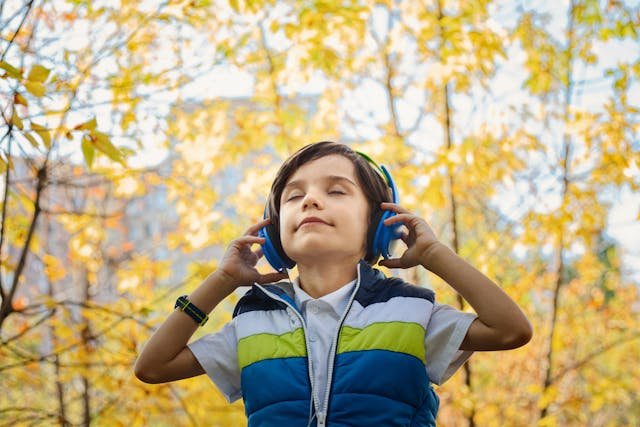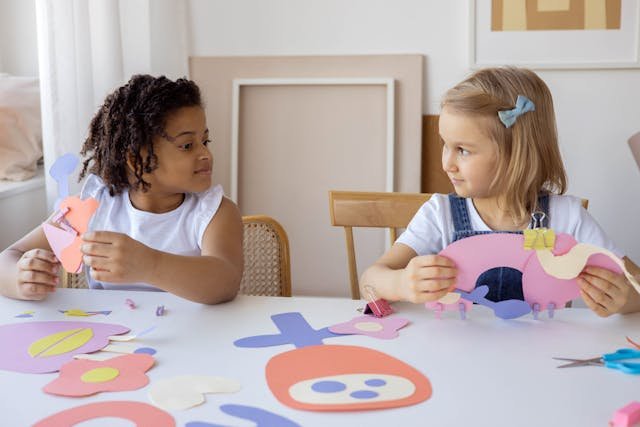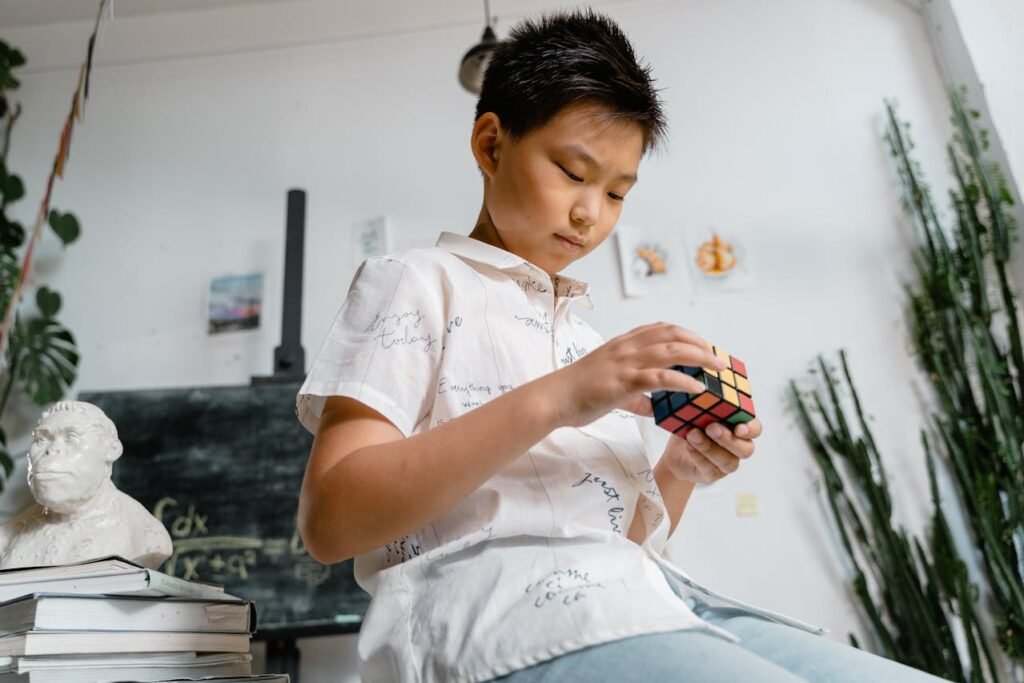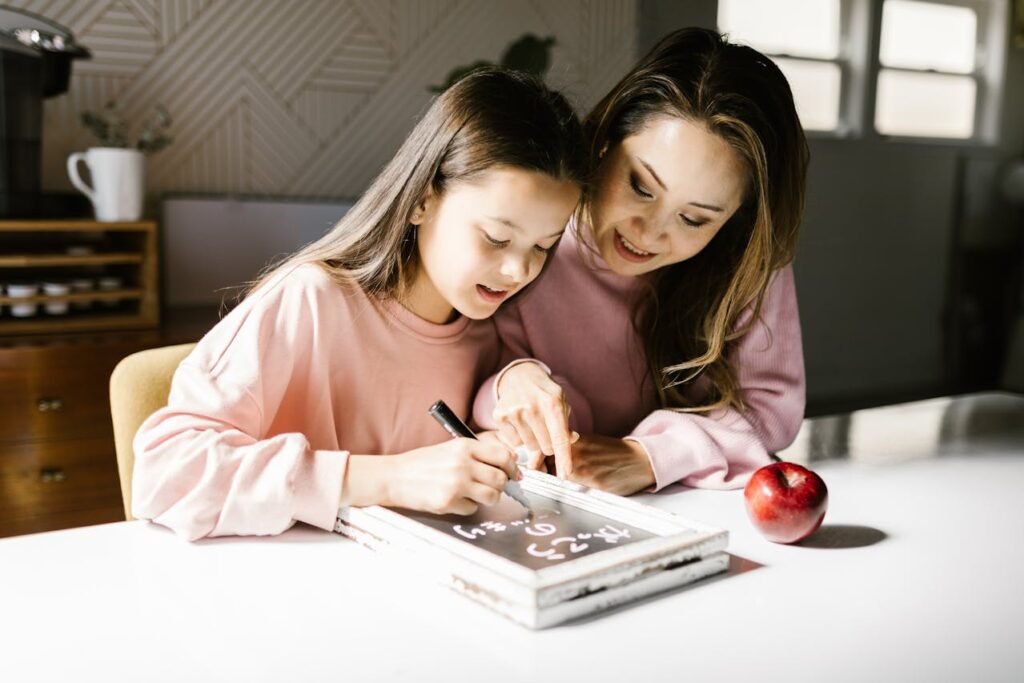Have you ever watched a child play with a piano, a guitar, or even bang on a few pots and pans? There’s a special kind of spark in their eyes. It’s not just play. It’s learning in action.
Music does something magical to the brain, especially when children start learning it early. But it’s not just about making sounds. It’s about how those sounds shape the way kids think, grow, and solve problems.
At Debsie, we work with amazing teachers across all subjects. And guess what? Many of them tell us that the kids who play music often do better not just in art, but in science, math, language — even focus and memory.
How Music Changes the Brain – Especially When You’re Young
When a child listens to music or plays an instrument, many parts of their brain “light up.” It’s like a workout for the brain — but way more fun than lifting weights!
Music makes the brain do many things at once. A child needs to listen, remember sounds, move their hands or body, follow patterns, and sometimes even read notes. This helps different parts of the brain talk to each other. The more they do it, the stronger those brain connections become.
This is super important when kids are still growing. Their brains are like soft clay — easy to shape. If we can shape that clay with music, we can help children grow into better thinkers, learners, and problem-solvers.
And here’s something really cool — studies show that children who learn music early often have:
- Better memory
- Stronger focus and attention
- Sharper language and reading skills
- Better math skills
- More confidence
Now let’s break that down.
Music and Memory: Making It Stick
Have you ever had a song stuck in your head? That’s because music sticks. It helps the brain remember things. When children learn music, they’re training their memory — without even trying.
Let’s say a child is learning a simple song. They need to remember the notes, the rhythm, and maybe the words. Their brain has to work hard — but they enjoy it, so it doesn’t feel hard. This kind of joyful memory training helps in school too. It’s easier to remember things in math or science when your brain is already used to storing music patterns.
In fact, many children who learn music show better scores in memory tests than those who don’t.
At Debsie, we see this all the time. Kids who take music classes remember steps better in science projects, or recall tricky math formulas more easily. Music gives their brain a head start.
Focus and Patience: The Hidden Superpowers
In today’s world, it’s easy to get distracted. There are screens everywhere and so much noise. But music can help kids slow down, pay attention, and stay on task.
When learning an instrument, a child has to really focus. They have to listen to each sound, try again if they make a mistake, and keep going. This teaches them patience and discipline — without punishment or pressure.
This kind of focus also helps with schoolwork. Children who practice music often do better at finishing tasks and staying calm under stress. They’re not afraid to try again if they get something wrong. They know practice makes progress.
We hear parents say all the time: “Ever since my child started music, they’ve become more focused — even in subjects they didn’t like before!”
Music and Math: More Connected Than You Think
This might surprise you, but music and math are like best friends.
Both use patterns. Both need counting. And both use timing. When a child plays music, they’re actually doing math — they just don’t know it yet!
Think about rhythm. It’s all about counting beats. Think about notes — they have lengths and values, just like numbers. So when a child plays music, they start to feel math in a very natural way.
That’s why many children who start music early also get better at solving math problems. It’s not magic. It’s just the brain learning how to spot patterns and think in steps — two very important math skills.
Language Skills: Music as a Secret Language Teacher
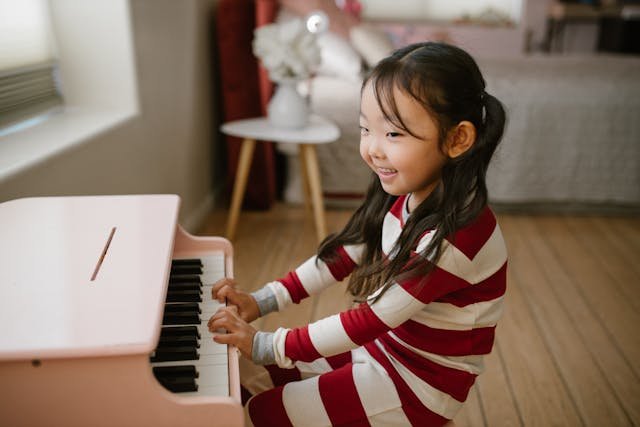
Here’s something amazing — children who learn music often become better at reading, writing, and even speaking.
Why? Because music trains the ears to hear sounds more clearly. This is super helpful when kids are learning letters, sounds, or a new language.
For example, when a child sings, they learn how to control their voice. They understand tone, pitch, and rhythm — all of which help them speak more clearly and read more smoothly. Music also teaches listening — not just hearing sounds, but truly paying attention to them.
Many young children who take music lessons find it easier to learn phonics and new vocabulary. They can pick out words faster and understand the way sentences flow — just like a melody.
At Debsie, we’ve seen students who were once shy or quiet become strong speakers after just a few months of singing and playing. Music builds confidence in using your voice — and that confidence carries over to every subject.
Boosting Confidence and Emotional Strength
Music is not just brainy — it’s emotional too.
When kids play an instrument or sing, they express feelings. They feel proud when they get better. They smile when someone claps for them. They feel joy when they finally play a full song on their own.
This builds self-esteem. It tells the child, “Hey, I can do hard things. I can create something beautiful.”
Even if a child doesn’t become a professional musician, learning music early teaches them to believe in themselves. And that’s a gift that lasts a lifetime.
Music also helps children handle their feelings better. It’s like a healthy outlet. If they’re sad, they can play a calm tune. If they’re happy, they might sing and dance. Music becomes a friend they can turn to anytime.
In fact, many teachers at Debsie use music in their regular classes — even in science and history — because they know how much it helps students relax and stay curious.
Problem Solving and Creative Thinking
Learning music is like solving puzzles. What note comes next? Why does this sound better than that? How can I fix this mistake?
These small questions build big thinking skills.
Kids who learn music become better at solving problems. They learn to try new things, to fix what doesn’t work, and to find creative solutions. They also learn that mistakes are okay — that trying again is part of learning.
That’s a powerful message. In a world where many kids fear failure, music teaches them that every wrong note is just one step closer to the right one.
And let’s not forget — music sparks creativity. Whether they’re writing a tune, changing a melody, or just playing for fun, kids get to think outside the box. And that’s the kind of thinking that leads to great ideas in every subject — from science experiments to writing stories.
Music and Social Skills: Learning to Play Together
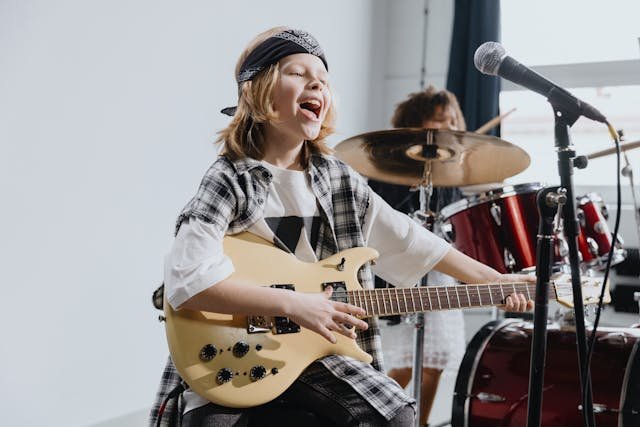
Music isn’t always a solo activity. Many times, kids learn music in groups. They sing together. They play in bands. They listen to each other.
This teaches teamwork. It helps kids learn to wait their turn, to listen carefully, and to blend their sound with others. These are skills they’ll use in every part of life — in school, at home, and later, in their jobs.
Children also learn to share ideas, support their peers, and work toward a common goal — like performing a song together.
At Debsie, we encourage students to work on music projects as a team. Whether it’s a group beatboxing challenge or creating a small virtual band, kids love the feeling of making something as a team. And they grow in kindness, patience, and confidence along the way.
Music Helps with Better Sleep and Lower Stress
We all want kids to be happy, calm, and well-rested. And guess what? Music can help with that too.
Listening to soft music before bed helps children relax their minds and bodies. It slows their heartbeat, lowers anxiety, and makes it easier to fall asleep. Good sleep helps the brain grow and stay sharp during the day. So yes, bedtime lullabies really do help!
But it’s not just about sleep. Music can reduce stress during the day too. Learning an instrument can give a child a sense of calm and focus — especially during tough times.
For example, when a child is upset or worried, playing music can help them feel better. They can use music to calm their feelings, just like taking a deep breath.
At Debsie, we sometimes start a class with a fun musical warm-up. It helps students leave their worries behind and get into a happy, ready-to-learn state. It works like magic!
The Sooner, the Better – Why Early Music Learning Matters Most
You might wonder — “Can’t my child start music later?”
Sure, they can. It’s never too late to start. But starting early has extra benefits.
Between the ages of 3 and 10, the brain is growing fast. It’s building pathways and learning how to learn. This is the perfect time to introduce music. It helps shape the brain’s foundation for all other learning.
Even simple music play — like clapping to a rhythm, singing songs, or playing with a toy drum — can help young kids develop stronger brain connections.
The earlier children start, the more natural music becomes. Their hands get used to movement, their ears tune into sounds, and their memory gets sharper. These are skills that last for years.
And most of all, early music learning builds love — a deep joy in learning that spreads into other subjects too.
That’s why Debsie includes music in our early learning programs. We don’t wait until a child is older. We make it fun, playful, and part of their daily learning — right from the start.
But What If My Child Isn’t “Musical”?
Some parents worry: “My child can’t carry a tune. Does that mean music isn’t for them?”
Absolutely not!
Being “musical” doesn’t mean being perfect. It just means enjoying sounds, being curious, and having fun with rhythm and melody.
Every child can learn music. Some may love to sing. Others might like to tap beats or move to music. Some may love listening more than playing. It’s all okay.
At Debsie, our music teachers know how to meet every child where they are. We focus on building joy first — then skills naturally follow.
No tests. No pressure. Just music that helps the brain, heart, and mind grow stronger.
Simple Ways to Start: Music at Home
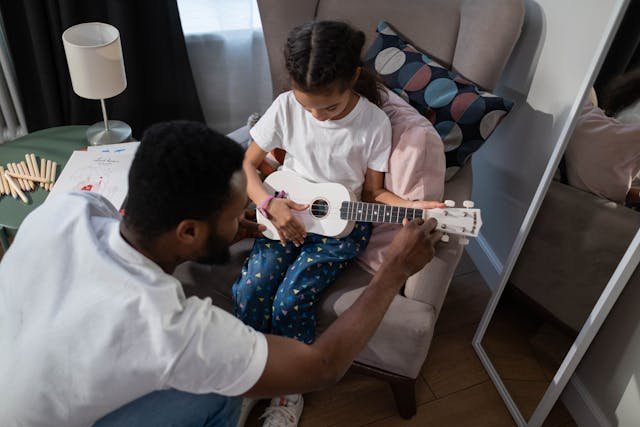
Many parents believe that to start learning music, a child needs a piano, a violin, or expensive lessons. But the truth is, music can begin right in your living room — with everyday sounds, moments, and smiles. Starting music at home doesn’t need to be complicated. It just needs to be joyful and a little bit consistent.
Let’s walk through some natural and easy ways you can bring music into your child’s life.
Let Music Fill the Background
One of the simplest things you can do is to play soft music during your child’s daily activities. Whether your child is drawing, reading, or simply relaxing, soft background music helps develop their listening skills. It trains their ears to notice tone, rhythm, and emotion in sounds. You can switch between calming classical music, playful kids’ songs, or gentle jazz. Over time, this becomes part of their learning environment — and their brain begins to treat music as something familiar, something they understand.
Make Singing a Daily Ritual
You don’t need to be a great singer to sing with your child. Children don’t care about perfect pitch — they care about connection. You can sing while folding clothes, cooking dinner, or getting ready for bed. Make up silly songs about what you’re doing. Even a simple “brush your teeth, brush your teeth” jingle can make daily routines more fun and musical.
Singing together also builds language skills, memory, and emotional bonds. It becomes a shared activity that creates smiles and calms nerves. When parents sing, kids learn that music is something humans do together — not just something on screens.
Use Clapping and Movement to Teach Rhythm
Your hands are your first musical instrument. Sit with your child and clap out a simple rhythm. Then let them copy you. Or make it a game — you clap three times, they clap four. Over time, these rhythm games train your child’s brain to notice timing, patterns, and coordination.
Dancing also helps. Turn on a fun song and dance around the room together. Moving to music builds body awareness and helps children feel rhythm in their bodies. It also releases energy and joy — two things every child needs.
Explore Sounds Around the House
You don’t need a drum set when a box and a spoon can do the trick. Your home is full of things that make interesting sounds. Tap a cup, bang a pot, shake a container with rice inside. Let your child explore these sounds safely. They’ll start to notice high sounds, low sounds, fast beats, and slow ones.
You can even create a small “sound corner” at home — a spot with a few safe objects that your child can use to make their own music. This kind of play helps build curiosity and confidence with music.
Share Music From Around the World
One beautiful thing about music is that it exists in every culture. At home, you can introduce your child to songs from different countries. Play a song from India one day, and a tune from Brazil the next. Watch music videos that show people playing unique instruments like the sitar, the balafon, or the pan flute.
This not only opens your child’s ears to new sounds, but also grows their sense of wonder about the world. It teaches them that music connects people across languages, cultures, and distances.
Use Music to Set the Mood
Music is also a powerful mood tool. If your child feels upset or tired, playing soft music can calm their body and mind. If they’re sleepy in the morning, a cheerful tune can help them wake up with a smile. You can use music the same way you use light or scent — to set the emotional tone for your home.
At Debsie, we often begin classes with a simple music moment to help children settle in. You can do this too at home. A quiet song before homework time. A dance song before chores. A lullaby before bed. These routines build comfort and structure.
How Debsie Makes Music Learning Easy and Fun
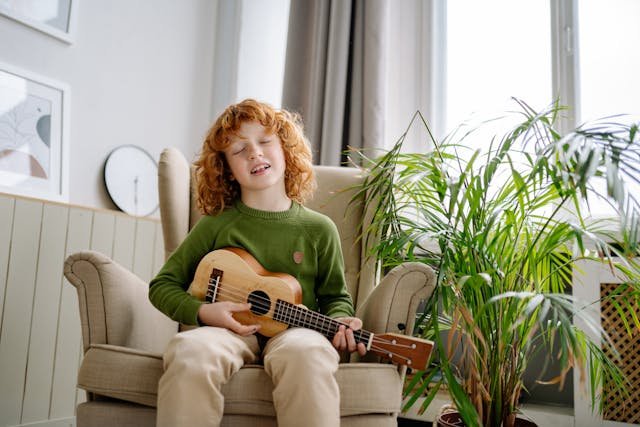
At Debsie, we believe music should never feel like a chore. It should feel like play. Like discovery. Like joy. That’s why we’ve built our entire music learning experience to be warm, simple, and exciting for every child — whether they’re tapping their first beat or composing their first song.
We understand that every child learns differently. Some kids love to sing. Some love to tap on things. Others love to listen, move, or explore sounds on their own. Our approach respects that. We meet each child where they are — and we take them where they can go.
Here’s how we do it.
Lessons That Feel Like Games, Not Schoolwork
From the first session, our music lessons are filled with fun. We turn music into a game. Children might play a rhythm challenge, match sounds to pictures, guess instruments by their tone, or learn songs through storytelling. Every activity is designed to keep kids curious and smiling.
There’s no pressure to get things “right.” Instead, we focus on exploration. Children are invited to try, to enjoy, and to grow. Mistakes are welcome — because every missed note is just a step toward learning.
This playful method helps children feel safe. And when they feel safe, they open up. They try new things. They build confidence, not just in music, but in themselves.
Friendly, Patient, and Talented Teachers
All of Debsie’s music teachers are specially chosen not just for their talent, but for their kindness. They are experts in music and experts in understanding young minds. They know how to explain things in simple ways. They know how to cheer a child on. They know how to turn a shy learner into a joyful one.
Many of our teachers are also trained in early childhood education, which means they understand how children grow — not just as students, but as people. They know when to push gently and when to pause. They know when a child needs help and when they need space to explore.
And the best part? Kids love them. Children look forward to class. They form strong bonds with their teachers. That connection becomes a powerful part of learning.
Music Lessons for All Ages and Levels
Whether your child is five or fifteen, Debsie has a music path that fits. We offer age-based learning tracks, so no one ever feels left out or left behind.
For younger children, lessons focus on movement, singing, sound discovery, and rhythm games. For older learners, we introduce basic music theory, composition, digital music-making, and even instrument practice if they’re ready.
Children can go as fast or as slow as they like. There’s no race. Only steady growth.
Some students may start with zero experience. Others may already know how to sing or play. Debsie welcomes them all and helps each one reach the next level.
Learn Live or On Your Own Time
Flexibility matters to families. That’s why we offer both live classes with real teachers and self-paced digital music journeys.
In live classes, children learn in small groups or one-on-one sessions, where they get to interact, ask questions, and receive personal attention. These are led by experienced teachers who guide them step by step.
In self-paced lessons, children follow a story-based learning path. They unlock levels, collect stars, and complete music challenges in a gamified experience. It feels more like playing a fun app than taking a class — but behind the scenes, they’re learning real music skills.
Both options are available in your Debsie dashboard. You can choose what fits your family best — or mix both!
Real Stories, Real Results
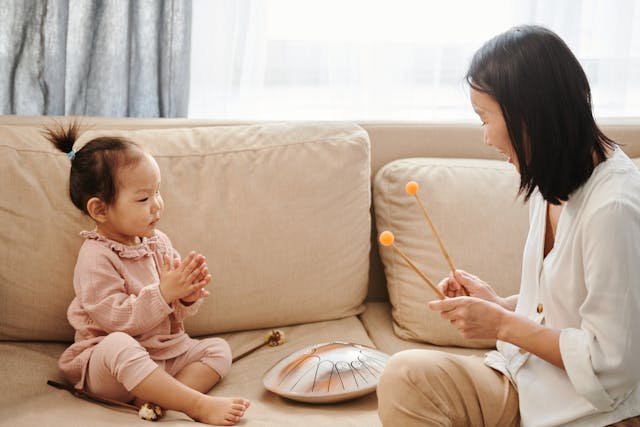
At Debsie, we don’t just talk about the benefits of learning music early — we see them every single day. We watch as shy children blossom into confident speakers, as restless kids become calm and focused, and as once-struggling learners begin to shine in unexpected ways. These are real children, real families, and real transformations.
Let us share a few stories from our global Debsie community — stories that prove just how powerful early music learning can be.
A Quiet Voice Becomes a Confident One
Maya, a seven-year-old from Nairobi, used to whisper when she spoke. Her teachers noticed she struggled to read out loud in class. She often looked down and avoided eye contact. Her mother enrolled her in Debsie’s music and storytelling program, hoping it would help her open up.
At first, Maya just listened. Then, slowly, she began to hum. After a few weeks, she was singing parts of songs. Her music teacher encouraged her to lead a warm-up song during class — and she did.
Today, Maya sings full songs with a smile. She even volunteered to narrate her school’s class play. Her mother told us, “It’s like music unlocked her voice — and now we hear it every day.”
Math Scores Improved After Music Classes
In Toronto, 9-year-old Aidan loved numbers but had trouble focusing during math homework. His mom signed him up for Debsie’s rhythm and beat-making course, just to try something new. To their surprise, within a few months, his math teacher noticed a big change.
Aidan was quicker at spotting patterns. He solved problems more confidently and stuck with harder tasks. His teacher said, “He’s thinking more clearly and not giving up so easily.”
The connection? Music had trained his brain to focus on patterns, timing, and step-by-step thinking — all core skills in math.
His mom wrote to us saying, “We signed up for music just for fun, but it helped Aidan love math again. I never expected that.”
Music Helped With Emotional Ups and Downs
When eleven-year-old Zara in India lost her grandfather, she became withdrawn and irritable. Her parents didn’t know how to help. A family friend suggested Debsie’s emotion-focused music program — a gentle course that helps children explore feelings through music.
Zara began learning to express emotions using piano sounds, songwriting, and vocal games. Over time, she found peace in the music. She started talking more, smiling more, and writing her own songs to cope with her emotions.
Her parents shared, “Music gave her a space to feel, without needing to explain. It helped her heal.”
Conclusion: The Power of Music in Growing Minds
Music is not just a hobby. It’s a powerful tool that shapes how children think, feel, and grow. It trains the brain in ways that books and screens cannot. It builds memory, focus, language, creativity, and even kindness.
When a child starts music early, they’re not just learning to play an instrument. They’re learning how to listen. How to try. How to express themselves. They’re learning patience. Confidence. Joy.
At Debsie, we’ve seen music turn quiet kids into leaders, daydreamers into focused thinkers, and nervous students into joyful learners. And it all starts with just one small step: exploring music with an open heart.
Whether your child is 5 or 15, now is the perfect time to begin. You don’t need fancy equipment. You don’t need to be a music expert. You just need a spark — and we’ll help you turn it into something beautiful.
Let us be your partner in this journey.
👉 Sign up for a free music trial class at Debsie today
👉 Or explore our full range of courses to see how your child can grow in math, science, coding, reading, and more — with music leading the way.
Read Next:
